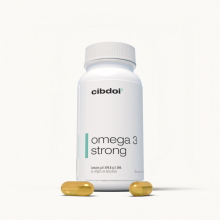Does Omega-3 Fish Oil Make You Look Younger?
Published:
Who doesn’t want to look and feel young for as long as possible? Many anti-aging skincare creams and supplements like collagen promise to turn back time. But what about omega-3 fish oil - can it really help you achieve a more youthful appearance? Let’s objectively examine the evidence.
Contents:

Overview of Omega-3 Fish Oil
Before analyzing the potential anti-aging effects, let’s first provide some background on what exactly omega-3 fish oil is:
What Are Omega-3s?
Omega-3s are essential fatty acids that the body cannot produce on its own. The main omega-3s in fish oil are:
- EPA (eicosapentaenoic acid)
- DHA (docosahexaenoic acid)
They play vital roles in heart health, brain function, fetal development, vision, and metabolism.
Why Is Fish Oil a Good Source?
Cold water fatty fish like salmon and tuna contain abundant amounts of EPA and DHA. Fish oil supplements are purified and concentrated from fish tissue.
The EPA and DHA in fish oil have potent anti-inflammatory properties that help resolve chronic inflammation. This provides many health benefits.
How Do Omega-3s Work in the Body?
Once consumed, EPA and DHA get incorporated into cell membranes throughout the body. This replaces pro-inflammatory omega-6 fats.
They also convert into specialized pro-resolving mediators that actively reduce inflammatory processes underlying many diseases.
Now that you have the basics on what omega-3 fish oil is, let’s analyze how it may help achieve a more youthful appearance.
Anti-Aging Effects of Omega-3s
Research suggests EPA and DHA may influence several aspects of the aging process. Here are some of the ways fish oil may help maintain a more youthful look:
1. Smoother, Less Wrinkled Skin
Omega-3s help skin stay supple and reduce wrinkle formation in several ways:
- Hydrating skin cells
- Reducing collagen breakdown
- Protecting against sun damage
- Neutralizing skin-damaging free radicals
This helps skin maintain elasticity and a wrinkle-free appearance for longer.
2. Reduction of Acne and Related Scarring
The anti-inflammatory effects help calm excess sebum production and pimple inflammation. This prevents severe acne breakouts that can lead to permanent scarring.
Maintaining a clear complexion provides a more youthful look.
3. Protection Against Photoaging
Photoaging from UV radiation breaks down collagen and causes coarse wrinkles, spots, and discoloration. Omega-3s help protect skin from sun-induced damage.
This prevents the premature formation of wrinkles, sagging, and age spots.
4. Increased Skin Hydration and Firmness
Dehydrated skin appears thinner and loses elasticity as we get older. Omega-3s help skin hold moisture and maintain plump firmness associated with youth.
5. Healthier Hair and Nails
Dry, brittle, thinning hair and nails are also signs of aging. Omega-3s keep hair and nails moisturized and strong, maintaining a youthful luster.
In these ways, ensuring optimal omega-3 status may help you stave off age-related changes to your appearance. But what does the clinical research show about the anti-aging effects?
Overview of Clinical Research
While the mechanisms above provide plausible theories for how omega-3s from fish oil may reduce visible signs of aging, what does the direct clinical evidence show?
Animal Studies
Many rodent studies demonstrate fish oil prevents wrinkle formation, protects collagen content, and reduces UV damage when applied topically or consumed orally.
Mice fed diets rich in omega-3s retained more youthful skin structure and elasticity. But animal research doesn’t always translate to humans.
Human Studies
Several clinical trials in humans show benefits for skin hydration, wrinkle reduction, smoother texture, lighter spots, and improved elasticity parameters after regular omega-3 supplementation.
However, most studies are small with design limitations. Larger scale trials are still needed.
Anecdotal Reports
Many people who have incorporated omega-3 fish oil supplements anecdotally report noticeable improvements in skin smoothness and hydration, reduced fine lines and wrinkles, accelerated wound healing, and stronger nails.
But more controlled research is warranted to corroborate these anti-aging observations.
Optimal Intake for Skin Health
Skin benefits appear most likely at intakes ≥2 grams EPA/DHA daily from fish oil or other purified sources according to research dose-response data.
Higher dosing may provide even greater anti-aging effects, but stay within safe limits (3-4 grams EPA/DHA daily).
Always choose high-quality, third-party tested oils to avoid potential contaminants that could negate benefits.
Additional Lifestyle Tips for Youthful Skin
While optimizing your omega-3 intake can help maintain a more youthful appearance, many other diet and lifestyle practices have anti-aging effects as well. Some to consider:
- Eat More Produce and Anti-Inflammatory Foods
Fruits, veggies, herbs, spices, tea, etc. provide antioxidants to protect your skin.
- Stay Hydrated
Drink plenty of water and eat moisturizing foods to keep skin supple.
- Wear Sunscreen
Protect skin from UV damage to prevent wrinkles and spots.
- Don’t Smoke
Smoking accelerates aging of skin by impairing collagen synthesis.
- Manage Stress
Chronic stress affects hormones that increase wrinkle formation.
- Get Enough Sleep
Lack of sufficient sleep shows on your skin. Aim for 7-9 hours.
- Exercise Regularly
Exercise boosts circulation to nourish skin and reduce inflammation.
Following an overall healthy lifestyle provides the most anti-aging benefits for your skin and body. But optimizing omega-3 intake can serve as a safe, natural way to defend against age-related changes to your appearance.
Health Benefits Beyond Anti-Aging
In addition to maintaining a youthful look, omega-3 EPA and DHA from fish oil offer many other evidence-backed health benefits:
Brain Health
Omega-3s support optimal cognitive function and brain structure. They may improve memory, processing speed, focus, and mood.
Heart Health
Omega-3s benefit cardiovascular health in numerous ways - improving triglycerides, blood pressure, vessel elasticity, plaque stability, and more.
Eye Health
DHA is a major structural component of the retina. Omega-3 intake protects vision and prevents age-related sight decline.
Metabolic Health
Omega-3s enhance insulin sensitivity, endothelial function, mitochondrial efficiency, and other aspects of metabolism.
Inflammation
As discussed, omega-3s potently reduce inflammation underlying many chronic diseases like autoimmunity, neurodegeneration, obesity, and aging.
So in addition to looking young on the outside, omega-3s help you stay young on the inside by promoting overall health and longevity.
Conclusion
While more research is still needed, the current evidence suggests EPA and DHA omega-3 fatty acids from fish oil may help defend against visible signs of aging like wrinkles, spots, dryness, and loss of elasticity.
The anti-inflammatory and antioxidant properties protect skin integrity and maintain a youthful structure and function.
However, a healthy lifestyle focused on whole foods, hydration, sun protection, sleep, stress management, and exercise likely provides more anti-aging benefits.
Optimizing your omega-3 intake serves as one piece of the puzzle for maintaining a youthful appearance along with broader strategies to support wellness as you age.
The best approach is a holistic one – take fish oil for what it can offer, but also embrace practices that nourish you inside and out. Combining sensible supplementation with a healthy lifestyle provides the most robust anti-aging and longevity effects.










